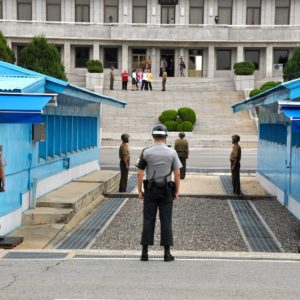WASHINGTON — The United States is elevating the profile of Korea in U.S. foreign policy with the appointment of a veteran Korean analyst and scholar with a track record dealing in Korean issues in both government and academe.
Word that President Trump has nominated Victor Cha as the next U.S. ambassador to South Korea, after leaving the post vacant for nearly a year, suggests the United States will be focusing even more closely on South Korea and the standoff with North Korea than it has since Trump’s election.
Cha, assuming he gets through questioning by congressional committees, will bring to the job a wealth of experience as author of some of the best-known books on Korean issues and as a negotiator in now dormant talks with North Korea.
On the basis of his experience as director of Asian affairs on the National Security Council during the presidency of George W. Bush, he appears as a conservative who will nonetheless prefer negotiations to the “military option” mentioned by Trump and members of his team.
Cha, in six-party talks hosted by China, had a hand in two deals during the last year of the Bush presidency under which North Korea agreed to give up its nuclear program on a highly organized schedule. After North Korea’s failure to live up to its side of the deal, Cha focused on writing books, teaching and lecturing on Korean issues. As ambassador, he may be expected to support South Korean President Moon Jae-in’s hopes for eventual reconciliation through dialogue.
Cha’s appointment comes at an especially critical moment in the long-running North-South standoff. Moon this week is to go Beijing, where he will meet China’s President Xi Jinping for talks about North Korea. Moon opposes a “pre-emptive strike” or other military action against North Korea, but he has also talked tough in denouncing North Korea’s nukes and missiles and calling for strengthening South Korea’s armed forces.
The top U.S. negotiator on North Korea, Joseph Yun, may also show up in Beijing with a message for Moon and Xi. The message is certain to emphasize the need for cooperation among northeast Asian countries while toning down if not ignoring anything to do with military force.
Cha will be sure to compares notes with those of Jeffrey Feltman, undersecretary for political affairs at the United Nations. Feltman warned the North Koreans that “time is of the essence” in working out a deal that might placate the North Koreans and lead to elimination of nukes.
In four days in Pyongyang, Feltman said he told North Korea’s foreign minister Ree Yong-ho that the North should “open channels” for dialogue in order to “reduce the risks,” meaning North Korea should agree to talks on its nuclear and missile program. North Korea said Feltman’s visit had created trust but accused the United States of nuclear threats.
Feltman warned against “miscalculations” that he said could lead to conflict with North Korea. North Korean negotiators stressed the need to end sanctions imposed after its nuclear and missile tests — most recently after test-firing an intercontinental ballistic missile last month.
Cha is thought to hold much the same set of beliefs in dealing with North Korea. At Georgetown University and at the Center for Strategic and International Studies, an influential think tank, Cha has impressed audiences as a soft-spoken, deliberate talker with a firm grasp on the realities of dealing with North Korea.
As ambassador, Cha will relieve the pressure on Marc Knapper, the deputy chief of the U.S. Embassy, who has had to carry the ball in Seoul for the Trump administration in a sensitive period. Knapper is well regarded, but the United States clearly needs an emissary with the rank of ambassador for sometimes difficult talks with South Koreans on a range of issues, including North Korea and trade.
The last U.S. ambassador to South Korea, Mark Lippert, made a favorable impression. Lippert, who was severely wounded in a knife attack while in Seoul, came with the blessing of the former president, Barack Obama, whom he served on the National Security Council. In conformance with U.S. policy under Obama, however, Lippert espoused “strategic patience” — an approach that Trump has disavowed.
Cha might be expected to advocate a relatively hard-line approach, but his books and articles indicate a preference for diplomacy. He is likely, however, to oppose “freeze-for-freeze” — the notion that North Korea might agree to stop testing nukes and missiles while the United States and South Korea halt military exercises.
U.S. officials, notably Defense Secretary Jim Mattis, see freeze-for-freeze as just a way to force U.S. and South Korean troops to compromise the defense of the South while North Korea goes on fabricating nukes and missiles while temporarily postponing tests. For similar reasons, they also oppose a “peace treaty” under which North Korea would demand total withdrawal of U.S. forces from the South.

